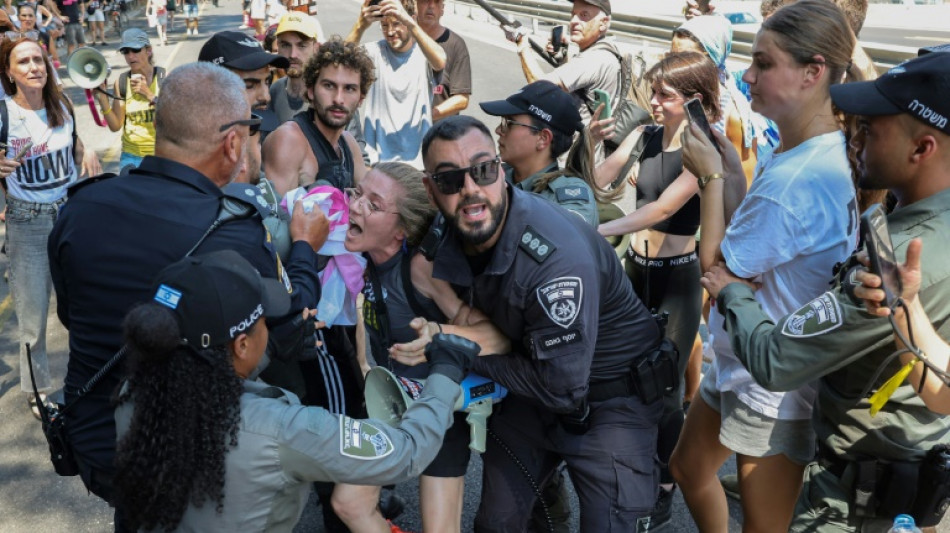
RYCEF
0.1700


Pressure mounted Monday on Israeli Prime Minister Benjamin Netanyahu as a major strike was held and US President Joe Biden said he was not doing enough to secure the release of Gaza hostages, following the killing of six captives.
Israelis were gripped by grief and fury after the military said Sunday the bodies of six hostages, all captured alive during Hamas's October 7 attack on southern Israel that triggered the war, were recovered from a tunnel in southern Gaza.
A strike announced by the main trade union seeking a deal to secure the remaining captives' release had brought parts of the country to a standstill, although some cities were largely unaffected.
But an Israeli court on Monday ordered an immediate end to the strike called by the Histadrut union, calling it "politically motivated".
The labour court ruling came after Finance Minister Bezalel Smotrich -- a far-right leader who opposes a truce in the Gaza war -- called on the court to move to ban the strike.
The union is authorised to call strikes only for economic reasons and workers' rights, not over political issues.
Alongside the surging domestic anger, diplomatic pressure has also grown, with the US president on Monday delivering some of his strongest criticism of Netanyahu.
Asked by reporters if he thought Netanyahu was doing enough on the issue, Biden responded: "No."
The US president was meeting with his negotiators who said they were "very close" to a final proposal to be presented to Israel and Hamas.
At mass rallies late Sunday, hostages' relatives called for a truce deal to help free the dozens still captive.
The health ministry said post-mortems showed the six had been "murdered... with several close-range gunshots" shortly before they were found.
- 'Abandonment of hostages' -
Histadrut called a nationwide strike beginning at 6:00 am (0300 GMT) Monday "for the return" of the remaining 97 hostages, including 33 the military says are dead.
Tel Aviv and the northern coastal city of Haifa heeded the strike call.
However, Ben Gurion international airport near Tel Aviv was operating "as usual", a spokeswoman told AFP, despite takeoffs being halted for two hours.
In Jerusalem and some other cities, life appeared to go on as usual. Some private firms partly suspended operations in support of the strike.
The strike followed mass protests Sunday on the streets of Tel Aviv and elsewhere, the latest anti-government rallies during the war.
Protesters again blocked roads in Tel Aviv Monday.
Histadrut chief Arnon Bar-David said he wanted to "stop the abandonment of the hostages", adding that "only our intervention can shake those who need to be shaken", an apparent reference to top Israeli decision-makers who have opposed a truce.
Of 251 hostages seized on October 7, just eight have been rescued alive by Israeli forces, although scores were released during a one-week truce in November -- the only one so far.
Israel named the killed hostages as US-Israeli Hersh Goldberg-Polin, Carmel Gat, Eden Yerushalmi, Almog Sarusi, Ori Danino and Russian-Israeli Alexander Lobanov.
On Monday, Jean-Marc Liling, a friend of Goldberg-Polin's family, told AFP the dead hostage was someone "who believed in co-existence with Palestinians".
- 'Stop everything' -
Gil Dickmann, a cousin of killed hostage Carmel Gat, said of Monday's strike: "I really hope this is a turning point."
On the ground in the Hamas-run Gaza Strip, the fighting raged on Monday, the second day of localised "humanitarian pauses" to facilitate a vaccination drive after the first confirmed polio case in 25 years.
An AFP correspondent reported some air strikes overnight, and the civil defence agency said shelling and gunfire rocked Gaza City, with two people killed by a missile.
Louise Wateridge, spokeswoman for the UN agency for Palestinian refugees, UNRWA, said 87,000 children received a first vaccine dose on Sunday in central Gaza.
There were shorter queues Monday, she said, but "this is to be expected".
"The biggest challenge now is just making sure that everybody has safe access" to the vaccination centres, she added.
UNRWA chief Philippe Lazzarini called the inoculation campaign a "race against time to reach just over 600,000 children" in the war-torn territory of 2.4 million people.
Israel's military campaign against Hamas has so far killed at least 40,738 people in Gaza, according to the territory's health ministry. The UN rights office says most of the dead are women and children.
The October 7 attack resulted in the deaths of 1,205 people, mostly civilians and including hostages killed in captivity, according to an AFP tally based on Israeli official figures.
- West Bank raids -
The war has sent regional tensions soaring, with violence surging in the occupied West Bank, separated from Gaza by Israeli territory.
The Ramallah-based Palestinian health ministry on Monday said at least 26 Palestinians have been killed since Israel launched simultaneous raids on Wednesday across the northern West Bank. Militant groups have claimed 14 of the dead as members.
Three Israeli police officers were also killed in a shooting Sunday in the southern West Bank.
Middle Eastern and Western governments as well as UN officials have called on Israel to end the large-scale operations in the Palestinian territory, which it has occupied since 1967.
In the city of Jenin, the streets were largely deserted and most shops were closed Monday, after explosions and clashes were heard overnight.
Elsewhere, Lebanon's health ministry said an Israeli strike on a vehicle in the south Monday killed two people.
burs-srm/jsa
S.Ogawa--JT